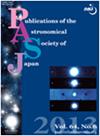The candidates of long-periodic variable sources in 6.7 GHz methanol masers associated with four high-mass star-forming regions
IF 2.6
4区 物理与天体物理
Q2 ASTRONOMY & ASTROPHYSICS
引用次数: 0
Abstract
Results of the long-term monitoring observations by the Hitachi 32 m radio telescope of the 6.7 GHz Class II methanol masers associated with four high-mass star-forming regions are presented. We detected periodic flux variability in G06.795−0.257, G10.472+0.027, G12.209−0.102, and G13.657−0.599 with the periods of 968, 1624, 1272, and 1266 d, respectively, although the detected period is tentative due to the short monitoring term relative to the estimated period. The facts that the flux variation patterns show the symmetric sine curves and that the luminosities of the central protostar and periods of maser flux variation are consistent with the expected period–luminosity (PL) relation suggest that the mechanisms of maser flux variability of G10.472+0.027 and G12.209−0.102 can be explained by protostellar pulsation instability. From the PL relation, the central stars of these two sources are expected to be very high-mass protostars with a mass of $\sim 40\, M_{\odot }$ and to have a mass accretion rate of $\sim 2 \times 10^{-2}\, M_{\odot }\:$yr−1. On the other hand, G06.795−0.257 and G13.657−0.599 have intermittent variation patterns and have luminosities that are an order of magnitude smaller than those expected from the PL relation, suggesting that the variation mechanisms of these sources originated from a binary system. Since almost all the maser features vary with the same period regardless of the geometry, periodic accretion models may be appropriate mechanisms for flux variability in G06.795−0.257 and G13.657−0.599.与四个高质恒星形成区相关的 6.7 GHz 甲醇蜕变器中的长周期可变源候选者
本文介绍了日立 32 米射电望远镜对与四个高质恒星形成区相关的 6.7 GHz II 类甲醇汽化器的长期监测观测结果。我们在 G06.795-0.257、G10.472+0.027、G12.209-0.102 和 G13.657-0.599 中探测到了周期性的通量变化,周期分别为 968、1624、1272 和 1266 d,尽管由于监测时间相对于估计周期较短,探测到的周期是暂定的。通量变化规律呈现对称的正弦曲线,中心原恒星的光度和maser通量变化周期与预期的周期-光度(PL)关系一致,这些事实表明G10.472+0.027和G12.209-0.102的maser通量变化机制可以用原恒星脉动不稳定性来解释。根据PL关系,这两个星源的中心恒星应该是质量为$\sim 40\, M_{\odot }$的大质量原恒星,其质量增殖速率为$\sim 2 \times 10^{-2}\, M_{\odot }\:$yr-1。另一方面,G06.795-0.257和G13.657-0.599的变化模式是间歇性的,它们的光度比根据PL关系所预期的要小一个数量级,这表明这些光源的变化机制来源于双星系统。由于无论几何形状如何,几乎所有的maser特征都以相同的周期变化,因此周期性吸积模型可能是G06.795-0.257和G13.657-0.599通量变化的合适机制。
本文章由计算机程序翻译,如有差异,请以英文原文为准。
求助全文
约1分钟内获得全文
求助全文
来源期刊

Publications of the Astronomical Society of Japan
地学天文-天文与天体物理
CiteScore
4.10
自引率
13.00%
发文量
98
审稿时长
4-8 weeks
期刊介绍:
Publications of the Astronomical Society of Japan (PASJ) publishes the results of original research in all aspects of astronomy, astrophysics, and fields closely related to them.
 求助内容:
求助内容: 应助结果提醒方式:
应助结果提醒方式:


